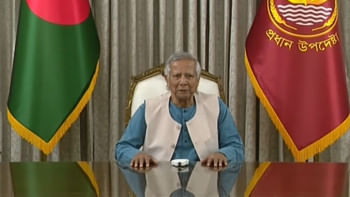LDCs should get preferential treatment

Chief Adviser Prof Muhammad Yunus yesterday advocated for Least Developed Countries to get preferential treatment due to their unique circumstances and development needs.
He said most vulnerable countries with limited decarbonisation capacity need adequate financial and technical support to develop green industries, according to the Chief Adviser's press wing.
"International collaboration is required to foster economic growth and create new job opportunities in emerging markets, supporting a just and inclusive transition," Prof Yunus told the High-Level Climate Club Leaders Meeting, jointly hosted by Germany and Chile, at COP29 in Azerbaijan's Baku.
He is attending the COP29 from November 11-14, along with some 200 world leaders. Today, he will address the Opening Session of the World Leaders Climate Action Summit at the conference.
The Chief Adviser said carbon leakage can dilute incentives for innovation in low-carbon technologies globally, as some sectors might prioritise cost over sustainable practices.
To mitigate these risks, he said policies such as carbon border adjustments and international cooperation are essential to balance decarbonisation efforts with economic stability.
"Conversely, these policies can affect the competitiveness of the companies of particularly vulnerable developing countries like Bangladesh, as strong emission policies will cause higher production costs, making them less competitive globally. "
Prof Yunus said deep, rapid, and sustained reduction in greenhouse gas emissions and comprehensive international action are required to reach net-zero carbon emission by 2050 and limit warming to 1.5°C.
He also said many decarbonisation technologies require significant upfront investment. "These high capital costs can be a barrier for industries, particularly in most vulnerable developing countries like Bangladesh, with limited access to financing."
He stressed financial support for private sector industries of developing countries from developed countries to accelerate innovation and shared learning.
The Nobel Laureate said Bangladesh is willing to work with the Climate Club to catalyse international cooperation in terms of capacity building, technology transfer, and concessional decarbonisation finance.
CA MEETS GLOBAL LEADERS
Prof Yunus met at least 20 top world leaders and heads of international agencies, including Turkish President Recep Tayyip Erdoğan.
President Erdoğan invited him to visit Turkey and assured Bangladesh of all possible help in its journey to carry out deep reforms and build a prosperous country.
Professor Yunus also invited the Turkish president to visit Bangladesh soon.
He also met UAE President Sheikh Mohamed bin Zayed Al Nahiyan and thanked him for releasing the 57 Bangladeshi nationals who were imprisoned for staging protests in solidarity with the students in July.
The chief adviser met and greeted Shehbaz Sharif, prime minister of Pakistan; Mohamed Muizzu, president of the Maldives; Tshering Tobgay, prime minister of Bhutan; and Ramchandra Paudel, president of Nepal.
Professor Yunus has been calling for the revival of the SAARC as a top platform for South Asia's eight countries.
He had earlier said that SAARC's revival would be a key cornerstone of his foreign policy.
Meanwhile, he also met FIFA President Gianni Infantino and invited him to join the youth festival in Bangladesh in January. Infantino accepted an invitation.
Prof Yunus briefed him about the festival and sought his help in bringing reputed women's football teams to Bangladesh.
While calling on Prof Yunus, Ahmed el-Tayeb, the Grand Imam of the Al-Azhar Al Sharif, said Bangladesh would prosper and grow under the leadership of the country's Chief Adviser Prof Muhammad Yunus.
He invited the Chief Adviser to deliver a speech at the millennium-old institution, saying the Al-Azhar University would announce new fully funded scholarships for Bangladeshi students.
Prof Yunus also invited the Grand Imam to visit Bangladesh and to see for himself the profound changes brought in by the student-led mass uprising.
The chief adviser handed him a copy of the Art of Triumph, the art book on the wall murals and graffiti painted during the revolution.
Among others, Prof Yunus also met the prime minister of Belgium; the president of Ghana; the prime minister of Bosnia and Herzegovina; the president of Rwanda; the prime minister of Albania; the president of Montenegro; the prime minister of Barbados; the vice presidents of Brazil and Iran; the environment minister of Brazil; the director generals of the International Organization for Migration and World Health Organization; and the chief of International Monetary Fund.


 For all latest news, follow The Daily Star's Google News channel.
For all latest news, follow The Daily Star's Google News channel. 



Comments